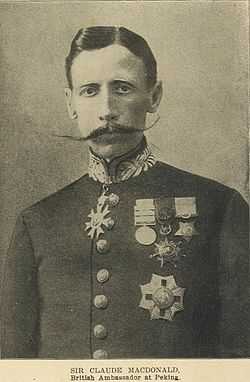Claude Maxwell MacDonald


Colonel Sir Claude Maxwell MacDonald GCMG GCVO KCB PC (1852 – 1915) was a British diplomat, best known for his service in China and Japan.[1]
Early life
MacDonald was educated at Uppingham School and Sandhurst, and was a soldier-diplomat, commissioned into the 74th Foot in 1872. He thought of himself as a 'soldier-outsider', as regards the Foreign Office.
Africa
His early career was in Africa. He served in the Egyptian campaign of 1882, from 1887 to 1889 was consul-general at Zanzibar, and then served some years as consul-general at Brass in the West African Oil Rivers Protectorate,[2] where in 1895 he was an observer of the rebellion of King Koko of Nembe.[3]
China and Korea
In 1896, MacDonald was appointed British minister to China. He was also the British Minister to Korea in 1896 through 1898.[4]
In China, MacDonald obtained a lease at Weihaiwei, and obtained railway contracts for British syndicates. He was instrumental in securing the Second Peking Convention, by which China leased to Britain the New Territories of Hong Kong.[2]
The Macartney-Macdonald Line
In 1899 he was the author of a Note which proposed a new demarcation of the border between China and British India in the Karakoram and Kashmir, now known as the Macartney-MacDonald Line, which still forms the basis of the border between China and Pakistan.[5]
As a military man, MacDonald led the defence of the foreign legations in 1900 which were under siege during the Boxer Rebellion, and he worked well with the Anglophile Japanese Colonel Shiba Goro.
Japan
MacDonald was appointed Consul-General for the Empire of Japan in October 1900.[6] He presided over the Tokyo Legation in years of harmony between Britain and Japan (1900–12), swapping posts with Sir Ernest Satow who replaced him as Minister in Peking. On 30 January 1902, the first Anglo-Japanese Alliance was signed in London between the Foreign Secretary Lord Lansdowne and Hayashi Tadasu, the Japanese Minister. MacDonald was still in Tokyo when the alliance was renewed in 1905 and 1911. He also became Britain's first ambassador to Japan when the status of the legation was raised to an embassy in 1905.[7]
MacDonald was made a Privy Councillor in 1906.
Selected works
In a statistical overview derived from writings by and about Claude MacDonald, OCLC/WorldCat encompasses roughly 10+ works in 20+ publications in 2 languages and 300+ library holdings.[8]
- 1900 — The Japanese detachment during the defence of the Peking legations, 1900
- 1900 — Reports from Her Majesty's minister in China [Sir C.M. Macdonald] respecting events at Peking. Presented to parliament, Dec. 1900
- 1898 — Despatch from Her Majesty's minister at Peking forwarding copies of the notes exchanged with the Chinese government respecting the non-alienation of the Yang-tsze region
Honours
- KCB(c): Knight Commander of the Order of the Bath (Civil division)
- GCMG: Knight Grand Cross of the Order of St Michael and St George
- KCB(m): Knight Commander of the Order of the Bath (Military division) - 29 November 1900 - in recognition of services during the recent Operations in China (Boxer Rebellion)[9]
- GCVO: Knight Grand Cross of the Royal Victorian Order
In popular culture
The fictitious character Sir Arthur Robinson in the film 55 Days at Peking (played by David Niven) is somewhat based on Claude Maxwell MacDonald.
See also
- List of Ambassadors from the United Kingdom to China
- List of Ambassadors from the United Kingdom to Korea
- List of Ambassadors from the United Kingdom to Japan
- List of Privy Counsellors (1901–1910)
- Anglo-Chinese relations
- Anglo-Japanese relations
Notes
- ↑ Nish, Ian. (2004). British Envoys in Japan 1859-1972, pp. 94-102.
- ↑ 2.0 2.1 Dictionary of National Biography
- ↑ Sir W. Geary, Nigeria under British Rule (1927), pp. 194-196
- ↑ Korean Mission to the Conference on the Limitation of Armament, Washington, D.C., 1921-1922. (1922). Korea's Appeal, p. 32., p. 32, at Google Books
- ↑ Mohan Guruswamy, Mohan, "The Great India-China Game," Rediff. June 23, 2003.
- ↑ The London Gazette: no. 27263. p. 81. 4 January 1901. Retrieved 03-11-2012.
- ↑ The first British Ambassador to Japan was appointed in 1905. Before 1905, the senior British diplomat had different titles: (a) Consul-General and Envoy Extraordinary and Minister Plenipotentiary, which is a rank just below Ambassador.
- ↑ WorldCat Identities: MacDonald, Claude Maxwell Sir 1852-1915
- ↑ The London Gazette: (Supplement) no. 27337. p. 4915. 24 July 1901.
References
- Nish, Ian. (2004). British Envoys in Japan 1859-1972. Folkestone, Kent: Global Oriental. 10-ISBN 1901903516/13-ISBN 9781901903515; OCLC 249167170
External links
| Wikimedia Commons has media related to Claude Maxwell MacDonald. |
- UK in Japan, Chronology of Heads of Mission
|